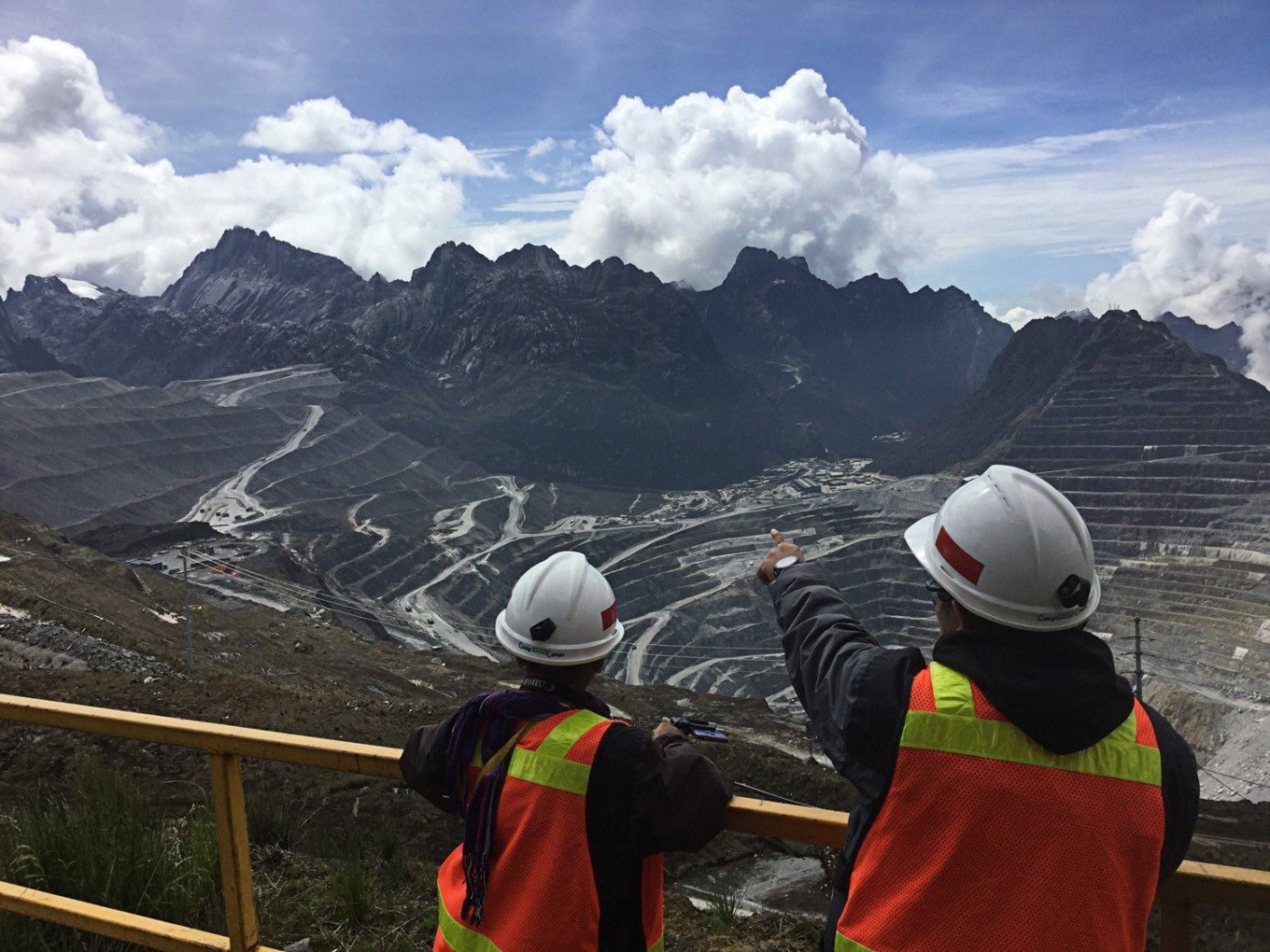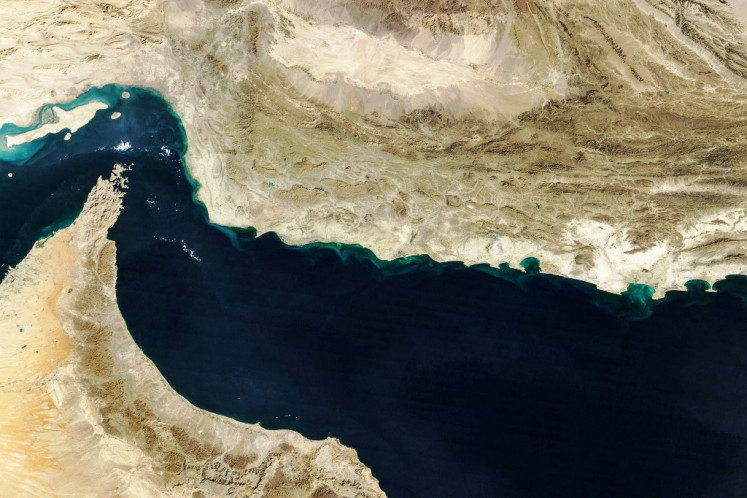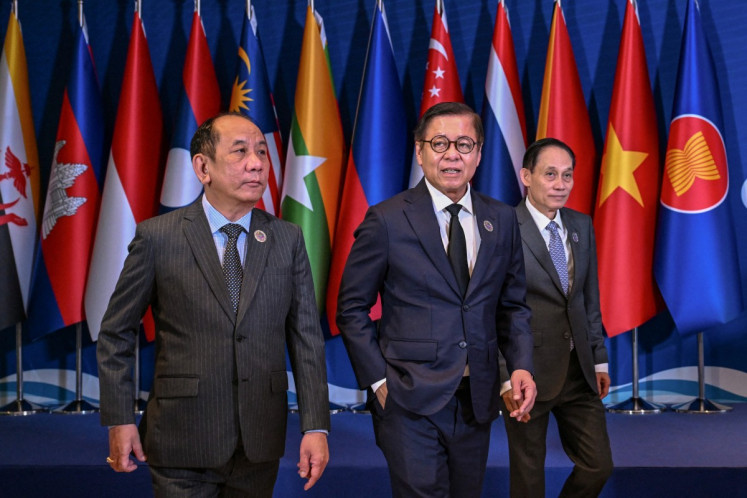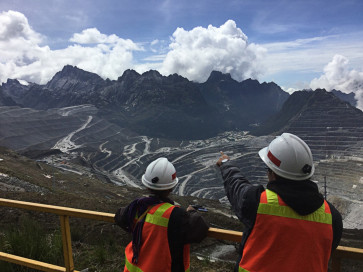Popular Reads
Top Results
Can't find what you're looking for?
View all search resultsPopular Reads
Top Results
Can't find what you're looking for?
View all search resultsAnalysis: Freeport copper ore export permit against downstream policy.
Change text size
Gift Premium Articles
to Anyone
 Workers at a mining site of PT Freeport Indonesia look at the Carstensz Pyramid in this undated photograph. The Supreme Audit Agency (BPK) has said that the US-based gold and copper miner has caused the state US$13 billion in losses from environmental damage. (thejakartapost.com/Nethy Dharma Somba) (thejakartapost.com/Nethy Dharma Somba)
Workers at a mining site of PT Freeport Indonesia look at the Carstensz Pyramid in this undated photograph. The Supreme Audit Agency (BPK) has said that the US-based gold and copper miner has caused the state US$13 billion in losses from environmental damage. (thejakartapost.com/Nethy Dharma Somba) (thejakartapost.com/Nethy Dharma Somba)
T
he government has once again granted PT Freeport Indonesia (PTFI) an exemption to export copper concentrate, an unexpected decision that appears to contradict its own downstreaming policy to transition the country from raw material exports to processed goods. Included in this policy is an export ban on copper concentrate and ores, and Freeport previously received a temporary exemption from this ban while building its copper smelter in Gresik, East Java. The facility was completed in March 2024 however, and many are now questioning whether Freeport’s export privilege is to continue indefinitely.
Energy and Mineral Resources Minister Bahlil Lahadalia defended extending PTFI’s export permit, pointing to commitments made in a 2023 agreement to renew PTFI’s mining license was renewed. The terms of this agreement included a requirement that the company invest in domestic refineries and processing plants to support national industrialization. This requirement was not unique to Freeport, however, and also applied other major mining firms, such as PT Amman Mineral Internasional.
The Gresik smelter is a cornerstone of the government’s copper downstreaming strategy and required an estimated US$3 billion investment. To ensure financial viability, PTFI negotiated its license to continue exporting copper concentrate during the smelter’s development. However, just as the smelter became operational, an unexpected fire broke out in October 2024 and severely damaged its sulfuric acid unit, essential for refining copper concentrate into copper cathode. The incident significantly disrupted the smelter’s operations, rendering it incapable of fully processing copper on-site.
PTFI initially planned to export only copper concentrate that didn’t meet certain purity thresholds and to process the rest once the Gresik smelter could resume partial operations, but the fire damage forced Freeport to halt these plans. As a result, it was left with a massive stockpile of copper concentrate it could neither export nor refine.
Data from the Energy and Mineral Resources Ministry show that around 400,000 tonnes of unused and unprocessed copper concentrate remain since December 2024. This backlog of idle material represents a serious economic risk, as Indonesia stands to lose significant revenue and thousands of downstream jobs. The government thus decided to extend Freeport’s export permit through June 2025 while also imposing a higher export tax on the company’s shipments, on top of the 7.5 percent duty it had paid. This tax hike is meant to balance the economic urgency with the government’s policy goals by allowing exports under stricter financial terms.
Despite ongoing criticism, PTFI appears to be deepening its integration with Indonesia’s downstreaming ambitions. President Prabowo Subianto recently inaugurated a new precious metals refinery (PMR) in Gresik, developed jointly by Freeport Indonesia and Japanese engineering firm Chiyoda Corporation. Located adjacent to the copper smelter, the PMR is expected to significantly enhance Indonesia’s capacity to refine gold and other precious metals.
The metals refinery has an installed capacity to produce an estimated 50 tonnes of refined gold per year, increasing Indonesia’s annual gold production to over 70 tonnes. It is also capable of producing 210 tonnes of silver, 30 kilograms of platinum and 375 kg of palladium each year. The PMR cost around Rp 10 trillion (US$630 million) to develop, underscoring the scale of PTFI’s investment in the country’s downstream industry.


















